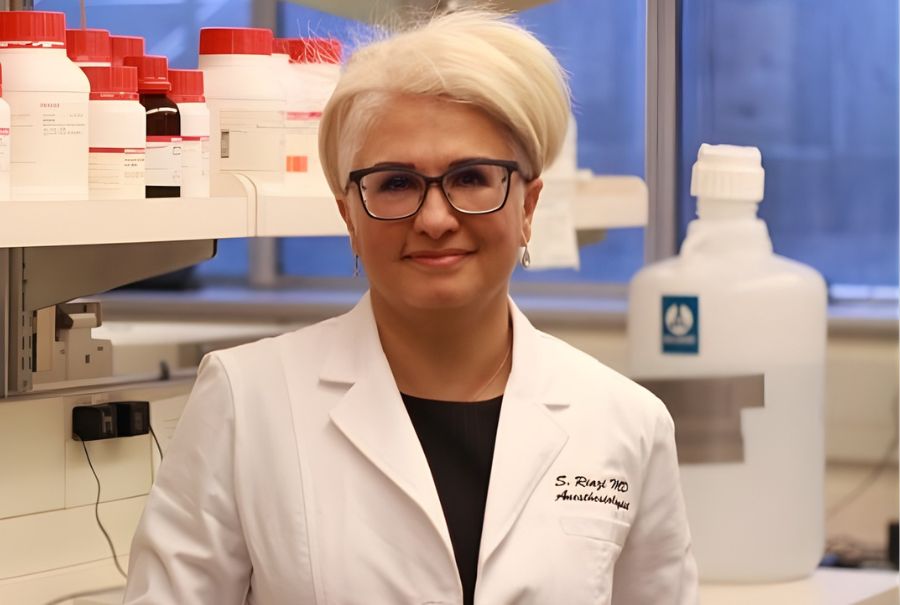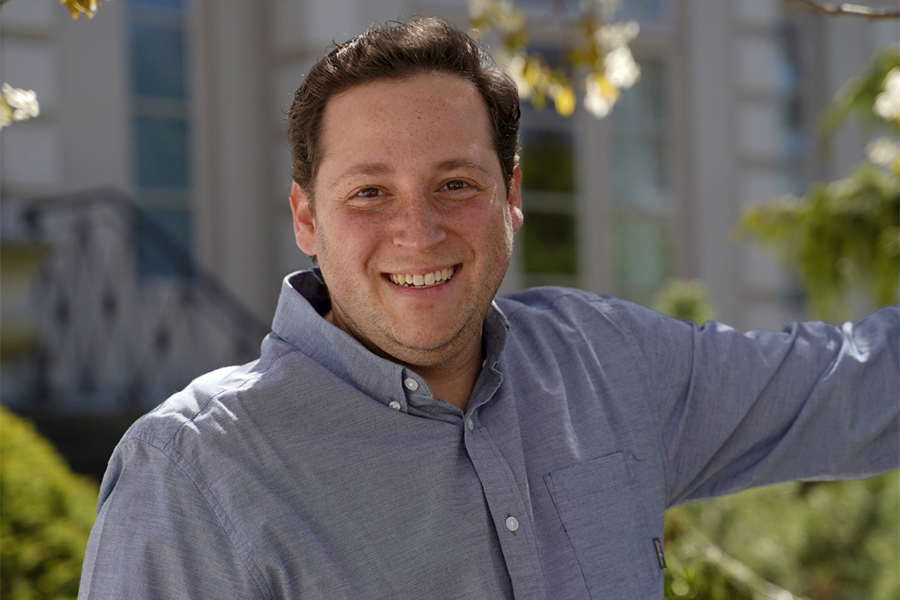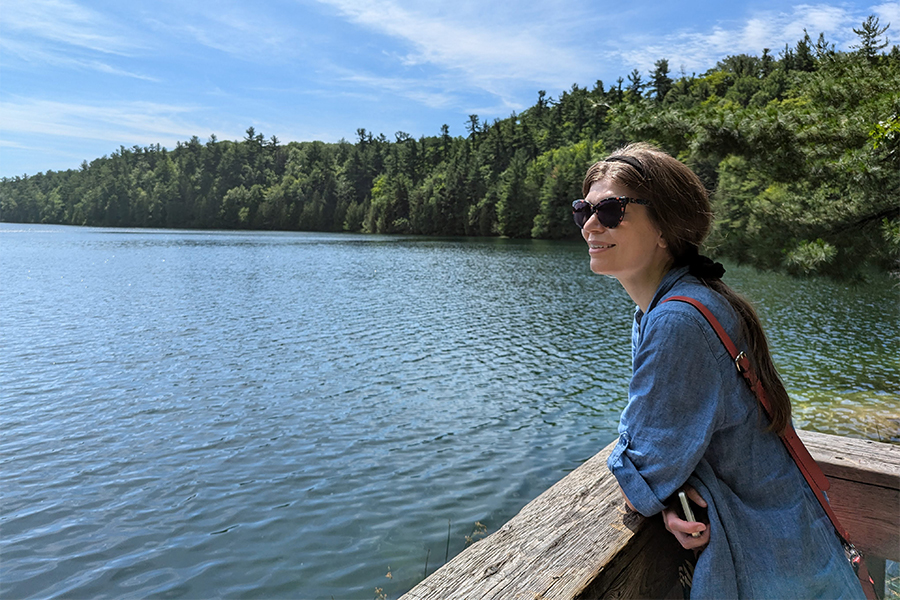In the latest Pandemic Perspectives essay, Dr. Susan Abbey, UHN’s Psychiatrist-in-Chief, describes the raw fear of the early days of the pandemic: “I updated my will. I filled my cupboards and fridge. Everyone was on high alert. Then COVID landed at our doors. We were in free fall.” (Photo: Emma Abbey)
By Dr. Susan Abbey
My two teenage daughters were born in China. In December 2019, my youngest and I were in the thick of plans to return to her birthplace for March break. But rumblings of illness in Wuhan began. I was nervous: was this the right time to be travelling? Then the real anxiety rolled in a few days later at 5:32 a.m. as I awoke to 680 News reporting that Wuhan was being locked down for an outbreak of undiagnosed pneumonia. The anxiety wasn’t just about the trip to a country with a mysterious illness, it was the knowledge that this might be “the big one,” the pandemic.
TeamUHN went into full planning mode. In February, I got my N95 mask fit done. The tester saw “Psychiatrist-in-Chief” on my UHN badge and started telling me about staff having panic attacks remembering Severe Acute Respiratory Syndrome (SARS) in 2003. I put on my mask and the smell of the testing agent unleashed memories of SARS. It took everything I had to keep it together. Those memories started to come back regularly as I walked the halls of Toronto General Hospital, and especially while seeing patients in the Medical Surgical Intensive Care Unit. Individual rooms were marked with memories of both patients who had been cared for in them and the staff who worked so hard trying to save them. SARS began filling my nightly dreams.
Each night, I was glued to the stories from Italy and Spain. I updated my will. I filled my cupboards and fridge. Everyone was on high alert. Then COVID landed at our doors. We were in free fall. Raw fear consumed the early days. Did I touch my face? Are their fomites on that elevator button/door handle/chart in the nursing station? How long do I need to decontaminate my groceries for?
‘The suffering we see on a daily basis has fueled the call for fundamental changes that advance health for all, and the recognition that physical and mental health are inextricably linked.’
– Dr. Susan Abbey
No one really knows how to be helpful in a pandemic. Everyone has their own needs. Some staff find talking helpful. Others need to “park” their feelings in order to keep working. Throughout the mental health community, practitioners dealt with their own increasing anxieties by developing new programs and tools for healthcare workers and the public. Everyone had a list of resources.
The pandemic has touched us all, requiring us to change our lives in significant ways. Everyone has struggled with the increased uncertainty of everyday life and the fast pace of changing scientific and public health advice. Loneliness and social isolation have increased. Hard to know whether those who were lonely were “better off” than those who were struggling to work at home with a partner and young children all squashed together. How to manage relationships, of all kinds, has become an increasing concern. How to find “downtime” or “recharge” when the world had turned upside down?
The media predicted a mental health crisis. There has been a shocking increase in opioid-related deaths. Child and adolescent eating disorders are at all-time high levels. Significant numbers of healthcare workers are reporting traumatic stress symptoms. Increasing numbers of people are reporting symptoms of anxiety or depression although we haven’t seen that translate into an increased demand for services.
The job of “fixing” this mental health crisis fell to those of us in mental health and wellness. It felt like all eyes were on us. It was a daunting task. Perhaps even unrealistic. How did one “fix” the stress of a pandemic? But the fearless work of colleagues in the Emergency Departments and Intensive Care Units (ICUs) and COVID wards inspired us. So we dug in. It never ceases to amaze me to see the deep and heartfelt commitment of our UHN Mental Health and Wellness teams. The Mental Health/Psychiatry teams pivoted immediately to offer services safely. The Wellness teams did yeomen’s work in quickly setting up highly-valued staff respite centres, a peer-to-peer confidential support line and a panoply of other resources. Colleagues in Psychiatry and Psychology came together to offer UHN CARES, including its online resources and one:one treatment, CREATE at Princess Margaret Cancer Centre, online support groups, meditation programs, and acceptance and commitment therapy groups. Donations and gifts honouring frontline staff provided tangible evidence of community support. Read more about UHN Wellness supports.
The pandemic may well be a tipping point that eliminates the stigma and discrimination people experience seeking mental health care. Every media outlet carries stories of the mental health toll of the pandemic. Paradoxically however, this moment carries the risk of medicalizing or pathologizing distress that is appropriate in these uniquely stressful times. We must remember that the majority of individuals exposed to traumatic stress recover.
It is normal to feel distressed in a pandemic. We have been deeply blessed in Canada to live in relative abundance and with ease. For many, this has been the first brush with the incontrovertible fact that we aren’t in control. We might be able to ask for a Starbucks grande latte in a venti cup with three shots, no froth and at 150 degrees but we aren’t able to control the pandemic. Many of us have lived in an illusory world and coming to terms with the fundamental lack of control in life holds important lessons.
‘The job of “fixing” this mental health crisis fell to those of us in mental health and wellness. It felt like all eyes were on us.’
– Dr. Susan Abbey
Throughout the pandemic, I have thought about my maternal lineage and how lucky I have been to reach this point in my life without having experienced an enduring, challenging reality. My great-grandmother escaped an Irish famine and crossed the Atlantic, my grandmother had the 1918 Pandemic and the Great Depression, and my mother told stories of the endless years of the Second World War and the relentless stream of friends crushed with the grief of losing brothers and boyfriends. Suffering is part of life. We all need to learn to work with it and not let it overwhelm us.
The pandemic has brought deepening and increasingly widespread realizations of the disparities present in modern healthcare. Our deep longing for equity, diversity and inclusion have all been advanced by the pandemic. The suffering we see on a daily basis has fueled the call for fundamental changes that advance health for all, and the recognition that physical and mental health are inextricably linked. For mental health practitioners, the reality of digital disparities has moved to the forefront as we daily come in contact with the divides in access to digital devices, digital literacy, access to the internet, adequate bandwidth and the simple privacy of having a place to talk. We are all called to action.
And now, the first anniversary has come and gone. We are in the thick of Wave Three. I fear that by the time you read this we are going to be in the grips of even greater challenges than we have seen to date. We are all tired. Some of us feel irretrievably broken. Some of us feel as though we can endure because there will come a day when we can gather again with the people we love and hold them close. Those of us on the frontlines of healthcare have been vaccinated and know we aren’t going to die, which is a huge gift. But, everyday we see new suffering. We are constrained by personal protective equipment, limited by it from offering even a simple smile of support. Beyond “our work” we are called to stand-in for loved ones who cannot be at the bedside. A few weeks ago, my uncle died in Sunnybrook’s ICU from aspiration pneumonia – I was thankful that we were far enough along in the pandemic that it was safe for me to be with him briefly. We had to turn off the high-flow oxygen in order for me to be allowed to hold his hand rather than bear witness from six feet away. I thought of all of the people who have died alone, their families who couldn’t be with them and the staff who were gutted by these realities. As I walked out into the bright March sun, I was disoriented to see a field hospital had arisen. It seemed implausible but in three short weeks, it now seems so wise.
We are not done yet. We are going to need to mourn the losses of this pandemic and find the good that we can take forward into tomorrow. We must meet this moment with compassion for ourselves and others. There is no other choice.
Dr. Susan Abbey is Psychiatrist-in-Chief, UHN, and Professor, University of Toronto


